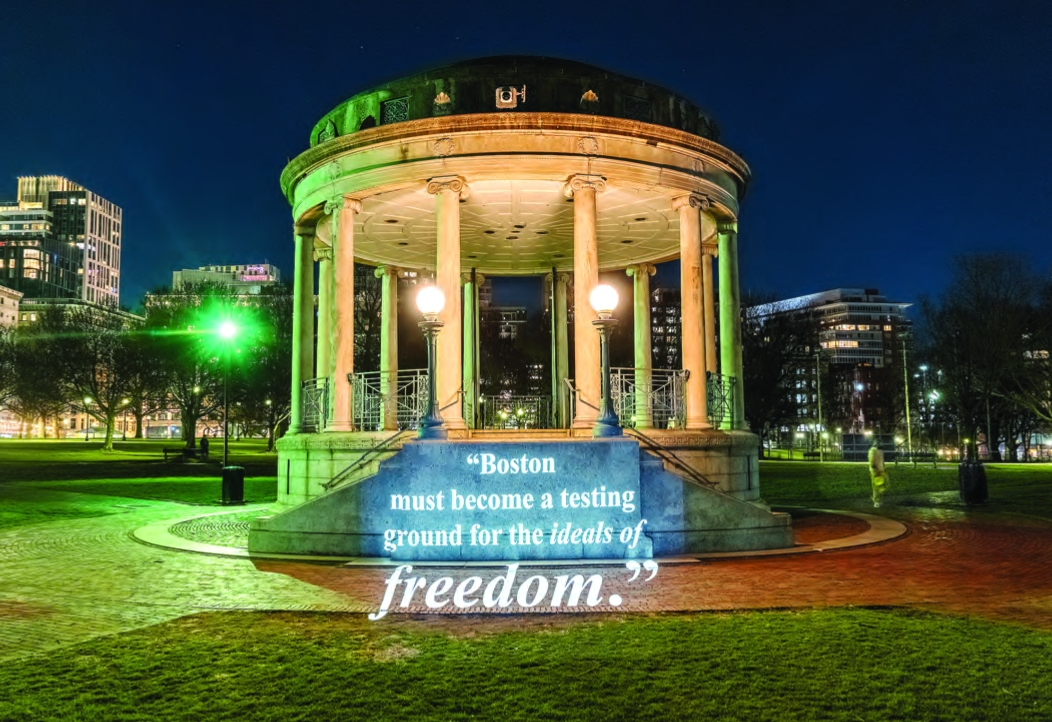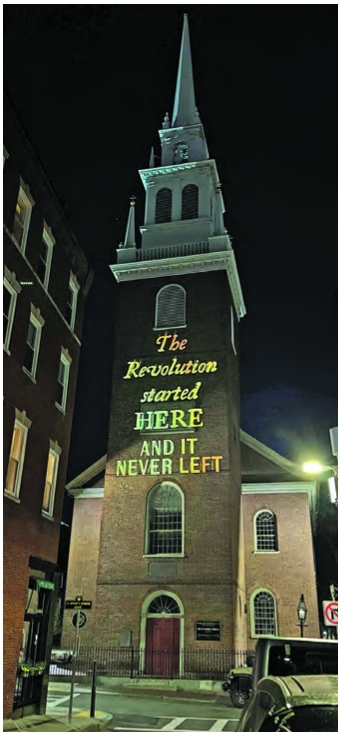
A
quote from Dr. Martin Luther King Jr. is projected on the Parkman
Bandstand on Boston Common in honor of the 1965 Freedom Rally.
A projection on Old North Church.
Over the past two-and-a-half months Bostonians have noticed projections popping up guerrilla-style on some of Boston’s most historic structures, including Old North Church, the Old State House and Boston Harbor. These ultra-temporary installations are part of a protest art project by the group Silence Dogood, a team of artists reflecting on Boston’s revolutionary history and its connections to the current political climate.
“When the current administration took office, I was struck by the parallels between what was happening in the 1770s and what’s happening now,” said Diane Dwyer, one of the artists in the largely anonymous group. “There are all of these moments in our history that we can point to where Boston hasn’t shied away from bullies or doing the right thing.”
The group draws its name from Benjamin Franklin. As a young man he wrote under the pseudonym Silence Dogood to publish satirical, political essays to avoid censorship.
The group’s first projection went up on the evening of March 5 on the Old State House after Mayor Wu’s congressional testimony. In response to border czar Tom Homan’s threat to “bring hell to Boston,” the projection read “You can’t bring hell to Boston, it’s been here waiting for you since 1770,” along with quotes from Wu’s testimony. The Old State House was the site of the Boston Massacre 255 years ago, the first bloodshed of the Revolution and an early example of excessive military force.
Usually projected for a half hour or less, enough time to document it through photos and video, the installations have shown quotes from history as well as messages related to current events. During the 250th celebration of the American Revolution and Paul Revere’s famed journey, the team projected excerpts from the poem “Paul Revere’s Ride” by Henry Wadsworth Longfellow as well as the slogan “One if by land, two if by D.C.”
“I wanted to make big statements in public space on the same buildings that have witnessed our history over the generations,” said Dwyer. Each projection comes with a written statement addressing the issues that inspired it.
Not
all the projections relate to the revolutionary period. On April 23,
the group projected on the Parkman Bandstand on the Boston Common in
celebration of the Freedom Rally that Dr.
Martin
Luther King Jr. led in 1965. It was the first civil rights march in the
Northeast and King led Bostonians from Roxbury to the Boston Common to
protest inequities in housing and education.
“Boston gets really caught up in a Founding Fathers
narrative,” said Dwyer. “But that revolutionary spirit didn’t stop once
the Declaration was signed. It’s been present in every generation of
Bostonians.”
As the
project garners more social media attention, Dwyer says Silence Dogood
getting lots of requests to announce projections in advance so audiences
can attend in person. Up until this point, the group has operated
sporadically, popping up at different locations with no notice or
official permission. Dwyer says some of the projections will continue
this way; it allows them to be agile in terms of timing and to react to
breaking news. But she does hope to produce some live events for public
participation.
The
impact of the project has already been widespread. Silence Dogood
solicits donations online to cover the costs associated with the
project, including running the expensive mobile energy unit that powers
the projector. Dwyer says small donations have been coming not just from
Boston, but also from Kentucky, Kansas and other areas of the country.
She’s also received requests for training from artist groups that want
to adopt the same model.
Dwyer says the Silence Dogood team hopes to rally Bostonians, and Americans, to resist tyranny, just like we did in the 1770s.
“I’m
hoping to reframe headlines for people. Every day these catastrophic
headlines come out that make us question the future of America and
democracy and freedom and liberty and all of our central values,” said
Dwyer. “This gives people hope that these times are not entirely
unprecedented, and we’ve met the moment before.”
ON THE WEB
Learn more at silencedogoodboston.com